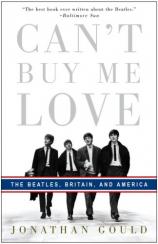Can’t Buy Me Love: The Beatles, Britain, And America
Review
Can’t Buy Me Love: The Beatles, Britain, And America
"There they were in America, all getting house-trained for
adulthood with their indisputable principle of life: short hair
equals men; long hair equals women. Well, we got rid of that little
convention for them." Thus said Paul McCartney, and this remark
goes to the heart of CAN’T BUY ME LOVE, Jonathan Gould's
sweeping analysis of the mopheads, their music and the culture ---
the culture they were born into and the culture they undeniably
created.
Gould has been working on his magnum opus of the Fab Four these 20
years, and it was 20 years well spent. A writer and musician, he
leads us through every album, every single, sometimes every note of
the Beatles' prolific musical output. His step-by-step journey into
Sergeant Pepper's Lonely Hearts Club Band took me right
back to the first time I heard it and the many times afterwards
that I listened to it with awe and admiration. Reading Gould's book
I now realize that these were Beatles who, in some ways, had
already passed their prime as a unitary force and were trying to
revive their own sense of wonder by "becoming" SPLHCB --- a new
group, new uniforms to disguise their status as the world's most
famous rock group, as they marched forward with musical forms
heretofore never heard on the planet. And it worked…oh how
well it worked! The four who were already tired of the Beatle image
and, to some extent, each other, soldiered on. Remarkably, The
White Album and Abbey Road were still a gleam in the
Beatles' eyes.
Gould states that over the years he grew tired of the personality
cult of Beatledom: George, the quiet, smart one; John, the angry
rebel; Paul, the musical and emotional smoother-over; and Ringo,
the hapless dolt --- roles that were established in the film A
Hard Day's Night and agreed on by the press and the boys
themselves as they learned to cope with mind-boggling
global adoration. Gould went behind the curtain, pulling out every
loose thread in the fabric.
The author reveals how the Beatles could be envious despite their
own success, how Lennon imitated Bob Dylan and how the group
ultimately ate into Dylan's fan base. Beginning as four guys from
proletarian families in Liverpool and playing hard rock in
dingy small clubs, they had emerged as a revolutionary force
of rock with a difference. The book begins with their visit to New
York and “The Ed Sullivan Show” in 1964. But from
playing mainly to weeping teeny-boppers, the boys grew up. They met
Dylan at last, and he introduced them to marijuana. Arguably,
that was a turning point. Beatles fans became the
middle-class, hip, psychedelic crowd, a world apart from the
boisterous working class audiences of Liverpool and the screaming
teens. As Gould puts it, pot made the difference between "those who
knew what was happening and those who didn't." Beatles fans
knew.
Cultural history records how the Beatles rose and never
fell, but Gould reminds us that their star was a fast-burning
comet. They never became perennial Vegas entertainers like
Sinatra or Grade-B movie actors with thousands of
recordings like Elvis. Though this was the sort of fame they
were heir to, it was not the crown they chose. They stayed
authentic at all times, often shocking and insulting the fawning
media that relentlessly pursued them. Their comments on the world
scene were sometimes superficial and pettish, but insightful at
times. Lennon's offhand remarks about the weaknesses of
Christianity, for example, cut right into a running battle between
religious fundamentalism and liberalism that rages yet. While
trying to keep their considerable paychecks rolling in by making
unforgettable sounds in the studio, each of the Beatles was
trying to be a very private, real person.
When interviewed by the same talking head who elicited
the observations from Paul about America cited above, Ringo
opined, "I suppose we got on together because we're the only people
like us; we're the only ones who really know what it's like."
Reviewed by Barbara Bamberger Scott on December 26, 2010
Can’t Buy Me Love: The Beatles, Britain, And America
- Publication Date: November 4, 2008
- Genres: Biography, Nonfiction
- Paperback: 672 pages
- Publisher: Three Rivers Press
- ISBN-10: 0307353389
- ISBN-13: 9780307353382




